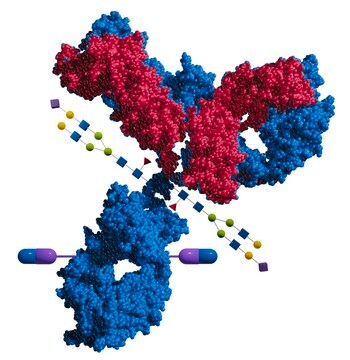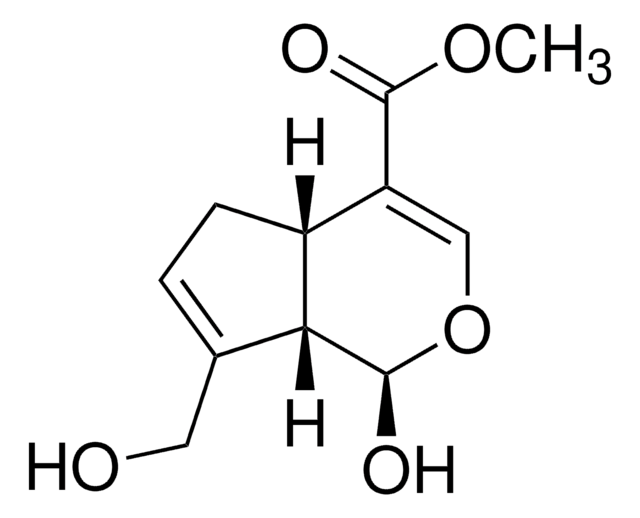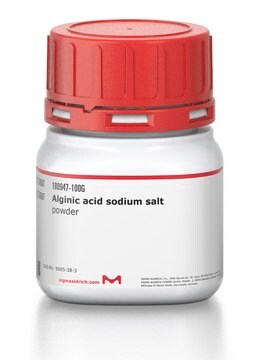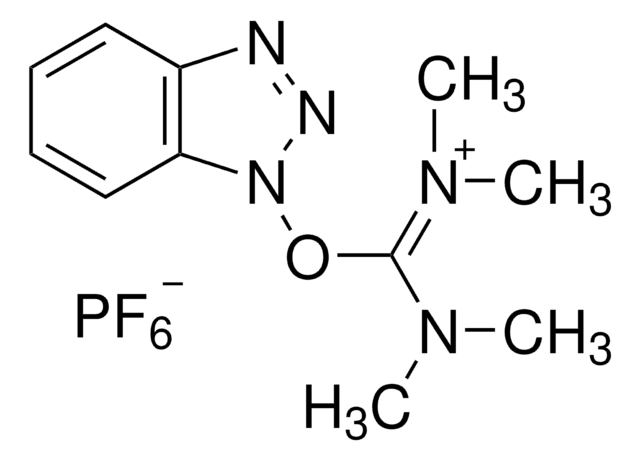SAE0159
Microbial Transglutaminase
lyophilized powder, ≥12 units/mg protein
Sinonimo/i:
Microbial Enzyme, Transglutaminase, Transglutaminase Enzyme
Autenticatiper visualizzare i prezzi riservati alla tua organizzazione & contrattuali
About This Item
Codice UNSPSC:
12352204
NACRES:
NA.54
Prodotti consigliati
Forma fisica
lyophilized powder
Livello qualitativo
Attività specifica
≥12 units/mg protein
Condizioni di spedizione
dry ice
Temperatura di conservazione
−20°C
Descrizione generale
Transglutaminases (TG) are a family of enzymes that catalyze isopeptide bond formation. This bond formation occurs between the γ-carboxyamide group of glutamine and various primary amines (primarily the ε-amino group of lysine). The resulting intermolecular or intramolecular cross-linking of transglutaminase is highly stable and shows high resistance to proteolytic degradation. The transglutaminase crosslinking activity support the formation of blood clots , skin and hair. On the other hand, TG is now being implicated in Celiac disease as well as in Huntington and Parkinson diseases. Historically, Microbial transglutaminase has been heavily used in the food industry. Microbial TG is often preferred for newer applications (such as site-specific protein modification and antibody drug conjugation) due to its small molecular weight and lack of calcium dependency when compared to the mammalian forms.
Applicazioni
Microbial Transglutaminase has been used for:
- Protein cross-linking & site-specific labeling
- Antibody Drug Conjugation
- 3D bioprinting bioink preparation
- Food related immunogenicity/pathogenicity related research
Caratteristiche e vantaggi
- Small (~38kDa) and calcium independent enzyme
- Highly purified lyophilized enzyme
- Consistent and reproducible activity
- Characterized for endotoxin content
Nota sulla preparazione
For R&D use only. Not for drug, household, or other uses. Please consult the Safety Data Sheet for information regarding hazards and safe handling practices
Stoccaggio e stabilità
Store the freeze-dried product at –20 °C. It is recommended to store the reconstituted protein in working aliquots at –20 °C to avoid repeated freeze/ thaw cycles.
Avvertenze
Danger
Indicazioni di pericolo
Consigli di prudenza
Classi di pericolo
Resp. Sens. 1
Codice della classe di stoccaggio
11 - Combustible Solids
Classe di pericolosità dell'acqua (WGK)
WGK 1
Punto d’infiammabilità (°F)
Not applicable
Punto d’infiammabilità (°C)
Not applicable
Certificati d'analisi (COA)
Cerca il Certificati d'analisi (COA) digitando il numero di lotto/batch corrispondente. I numeri di lotto o di batch sono stampati sull'etichetta dei prodotti dopo la parola ‘Lotto’ o ‘Batch’.
Possiedi già questo prodotto?
I documenti relativi ai prodotti acquistati recentemente sono disponibili nell’Archivio dei documenti.
Matthias Torsten et al.
Frontiers in pediatrics, 6, 389-389 (2019-01-09)
The enzyme microbial transglutaminase is heavily used in the food processing industries to ameliorate food qualities and elongate the products' shelf life. As a protein's glue, it cross-links gliadin peptides, creating neo-complexes that are immunogenic and potentially pathogenic to celiac
Miaomiao Zhou et al.
Biofabrication, 11(2), 025011-025011 (2019-02-12)
Gelatin methacryloyl (GelMA) is a versatile biomaterial that has been shown to possess many advantages such as good biocompatibility, support for cell growth, tunable mechanical properties, photocurable capability, and low material cost. Due to these superior properties, much research has
Martin Griffin et al.
The Biochemical journal, 368(Pt 2), 377-396 (2002-10-09)
Transglutaminases (Tgases) are a widely distributed group of enzymes that catalyse the post-translational modification of proteins by the formation of isopeptide bonds. This occurs either through protein cross-linking via epsilon-(gamma-glutamyl)lysine bonds or through incorporation of primary amines at selected peptide-bound
Il team dei nostri ricercatori vanta grande esperienza in tutte le aree della ricerca quali Life Science, scienza dei materiali, sintesi chimica, cromatografia, discipline analitiche, ecc..
Contatta l'Assistenza Tecnica.









